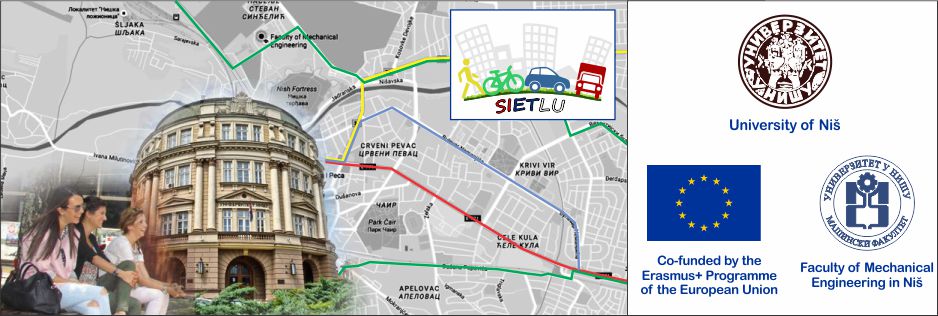JEAN MONNET MODULE SIETLU - SUSTAINABLE, INTELLIGENT AND ENVIRONMENT FRIENDLY TRANSPORT AND LOGISTICS IN URBAN CONTEXT: PROMOTING EU STANDARDS AND PRINCIPLES IN SOUTHEAST REGION OF SERBIA
General SIETLU Jean Monnet Module objective is to promote EU standards and principles in the field of interdisciplinary studies of transport, logistics and environmental science in Southeast region of Serbia. The aim of the module is enhancement of knowledge and competency of young people related to transport and environment protection who do not learn enough about the politics of EU integration in their education and syllabi. This module provides the opportunity to continue their study and education at the newest principles of urban life that exist on the territory of EU, which are based on sustainable development and supported by modern technology. Module is primarily intended for graduated students in field of engineering, economics, law, medicine, social sciences and humanities.
The SIETLU Module is innovative in Serbia, particularly in the field of green transport and logistics, as promotes Europeanisation studies methodology and knowledge not only through lectures and training courses but also through students seminars, thematic conference, Module website and an academic publication on serbian language. Another specific objective of Module is to stimulate young generation of Serbian academics - professors and researchers, to collect, elaborate analyse and disseminate European Union facts and knowledge particular in the field of sustainable, intelligent and environment friendly transport and logistics.
Realization of the SIETLU Jean Monnet Module, through the educational process, should provide conditions and resources for implementation of sustainable EU transport policy that can improve efficiency and to reduce environmental impact of freight logistics in Serbia. Focus will be placed on urban transport because it's great importance when it comes to the impact on the environment, resources conservation, better organization and functioning of the urban area.
In the first part of the course, the legal and economic principles of EU and the principles of sustainable development and information and communication technology (ICT) will be enclosed to students. In order to understand the concept of functioning of EU as well as modern transport on its territory, EU's institutions, bodies and legislation on transport and logistics policy as well as new trends (White paper, the Green Paper Towards a new culture for urban mobility) will be presented to the students. Students will be brought closer to basics and history of economic integration, the EU's common and good financial market as well as European Monetary Union (EMU). In this way the principles of the EU, that are vital in the transition period of our country to the EU, are approaching to young people. By accepting these ideas and understanding of the legal and economic principles barriers to the EU will be removed and created a sense of community across the whole Europe. The EU development are based on sustainable development and therefore students will be introduced to the basic pillars of this concept to realize that the progress is only possible if all human activities as well as urban transport take into consideration environmental protection, economic value of the processes and their effect on society. The main topic of the course is promotion of innovative and cost effective urban logistics solutions in order to develop systems that improve sustainability of the cities having in mind dramatically increasing of pollution and resources reducing. The priority goal in EU transport policy is improvement of the efficiency and reduction of the impact of freight logistics on environment. In that way, efficient solution in transport, resource efficient logistic in urban area as well as examples of EU smart cities and communities will be presented students. Students will be introduce with the benefits and possibilities of ICT which play an important role in everyday life in the 21st century. The possibility of ICT, as a tool for intelligent support and techniques for transportation planning and optimization in urban areas as well as ICT implementation of computational intelligence techniques and its growing importance for efficient mobility and smart cities will be shown. As an important part of the logistics of smart and sustainable cities in EU area is management of environmental protection. Students will be shown the sources of pollution, the type of pollution and modern concepts for monitoring, control and reduce of urban pollution. It is of great relevance to show course participants new concepts in the pollution reduction and control technique on the territory of EU such as improving energy efficiency, construction of smart buildings, green roofs, recycling of energy, waste water and solid waste. Examples of good practices from EU cities will be shown.
It is necessary to draw attention to laws, standards, and strategies that are valid in this field, especially at the time when our country opens new chapter in EU accession process. It can be expected that after completion of the course participants apply the acquired knowledge in their private and professional life and be able to recognize new positive trends from EU in the field of sustainable development and modern urban life.
SIETLU module staff
01.09.2016.

 English (UK)
English (UK) Српски-ћирилица
Српски-ћирилица 